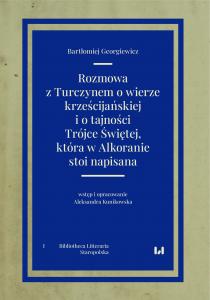-
2157
-
2111
-
2101
-
1422
-
1327
Rozmowa z Turczynem o wierze krześcijańskiej i o tajności Trójce Świętej, która w Alkoranie stoi napisana
Staropolska

Pliki do pobrania
W XVI wieku chrześcijańska Europa przeżywała coraz większe niepokoje związane z postępującą w głąb kontynentu ekspansją Imperium Osmańskiego. Odpowiedzią na zagrożenie ze strony azjatyckiej potęgi była obfita literatura antyturecka.
Jednym z autorów pism tego rodzaju (tzw. turcyków), był Bartłomiej Georgiewicz, z pochodzenia Chorwat, poddany węgierski. Po bitwie pod Mohaczem został pojmany i sprzedany do pracy w głąb Azji. Po ryzykownej ucieczce, kończącej blisko dziesięć lat niewoli, powrócił do Europy i poświęcił się całkowicie antytureckiej propagandzie.
Opisywał orientalną rzeczywistość Imperium Osmańskiego, którą oglądał na własne oczy, a zarazem surowo oceniał. Podawał Europejczykom wiadomości o ustroju, armii, religii, obyczajach i podstawowym słownictwie tureckim. Najoryginalniejszy koncept to analiza arabskiej basmali jako znaku trynitarnego, ukrytego w Koranie.
Pisma Georgiewicza, publikowane w całej Europie po łacinie i w językach narodowych, zostały wydane również w Krakowie w 1548 roku, w wersji łacińskiej i polskiej; zawładnęły wyobraźnią polskich czytelników i naszych rodzimych twórców.
Niniejsza edycja zabytku polskiego piśmiennictwa zawiera wstęp, objaśnienia i słowniki. Adresatami publikacji są filolodzy (nie tylko polscy i tureccy), językoznawcy, bibliolodzy, bibliotekarze i bibliotekoznawcy, edytorzy, religioznawcy, historycy.
Bibliander Theodor, De ratione communi omnium linguarum et literarum commentarius, Tiguri [Zurich] 1548.
Georgiewicz Bartłomiej, De afflictione tam captivorum quam etiam sub Turcae tribute viventium Christianorum […]. Similiter de ritu deque ceremoniis domi, militiaeque ab ea gente usurpatis…, Vormatia 1545.
Georgiewicz Bartłomiej, De captivitate sua apud Turcas (1526–1538), hrsg. R. Klockow, M. Ebertowski, Berlin 2000.
[Georgiewicz Bartłomiej], De ritibus et differentiis Graecorum et Armeniorum, tum etiam de captivitate illius, ac caeremoniis Hierosolymitanorum in die Paschalis celebrandis libellus [Antwerpia 1544].
Georgiewicz Bartłomiej, Libellus vere Christiana lectione dignus…, Roma 1552.
Georgiewicz Bartłomiej, Pro fide Christiana cum Turca disputationis habitae, et mysterio sanctissimae Trinitatis in Alchorano invento, nunc primum sermonem verso, brevis descriptio, Vienna 1548.
Georgiewicz Bartłomiej, Pro fide Christiana cum Turca disputationis habitae et mysterio sanctae Trinitatis in Alchorano invento, nunc primum in latinum sermonem verso, brevis descriptio, Kraków 1548.
Georgiewicz Bartłomiej, Prognoma sive praesagium Musulmannorum, de Christianorum calamitatibus et de eorum interitu ex Turcico sermone in Latinum conversum, Kraków 1548.
Georgiewicz Bartłomiej, Rozmowa z Turczynem o wierze krześcijańskiej i o tajności Trójce Świętej, która w Alkoranie stoi napisana, Kraków 1548.
Georgiewicz Bartłomiej, Specchio della peregrinatione delli piu notabili luoghi della Terra Santa di Promessione…, Roma 1554.
Georgius de Hungaria, De moribus, conditionibus et nequitia Turcorum, [b.m. ok. 1480].
Gessner Konrad, Mithridates. De differentiis linguarum, tum veterum tum quae hodie apud diversas nationes in toto orbe terrarum in usu sunt, Tiguri [Zurich] 1555.
Kara Mustafa pod Wiedniem. Źródła muzułmańskie do dziejów wyprawy wiedeńskiej 1683 roku, z tureckiego przeł. i oprac. Z. Abrahamowicz, Kraków 1973.
Koran, przekł. z j. arabskiego i koment. J. Bielawski. Warszawa 1986.
Megiser Hieronim, Institutiones linguae turcicae libri quatuor, Lipsiae 1612.
Münster Sebastian, Cosmographia universalis, Basel 1544.
Konstanty z Ostrowicy, „Pamiętniki janczara” czyli „Kronika turecka” […] napisana między r. 1496 a 1501, wyd. J. Łoś, Kraków 1912.
Paszkowski Marcin, Dzieje tureckie i utarczki kozackie z Tatary, wstęp i oprac. A. Siemieniec-Gołaś i A. Pawlina, Kraków 2018.
Pismo Święte Starego i Nowego Testamentu w przekładzie z języków oryginalnych, oprac. Zespół biblistów polskich z inicjatywy benedyktynów tynieckich, wyd. 3 popr., Poznań 1980.
Aksulu Nurdan Melek, Die Türkenschrift „De Turcarum ritu et caeremoniis” (1544) des Bartholomaeus Georgiević und ihre beiden deutschen Übersetzungen von 1545, Ankara Üniversitesi, Sosyal Bilimler Enstitüsü, Ankara 1989.
Aksulu Nurdan Melek, Mohaç Esiri Bartholomaeus Georgievic (1505–1566) ve Türklerle İlgili Yazılari, Ankara 1998
Bandtke Jerzy Samuel, Historia drukarń w Królestwie Polskiem i Wielkiem Księstwie Litewskiem, Kraków 1826.
Baranowski Bohdan, Znajomość Wschodu w dawnej Polsce do XVIII wieku, Łódź 1950.
Bator Wiesław, Nacjonalizm węgierski – zarys problemu, [w:] Różne oblicza nacjonalizmów, red. B. Grott, Kraków 2010, s. 385–444.
Basaj Mieczysław, Bohemizmy w polskich przekładach dzieł B. Georgevichiusa, „Poradnik Językowy” 1960, z. 4, s. 166–187.
Bielawski Józef, Wprowadzenie, [w:] Koran, przekł. z j. arabskiego i koment. idem, Warszawa 1986, s. 741–833.
Danti Angiolo, O nową interpretację „Kroniki tureckiej” – po latach, [w:] Studia porównawcze o literaturze staropolskiej, red. T. Michałowska i J. Ślaski, Wrocław 1980, s. 135–156.
Danti Angiolo, „Utopijny” aspekt literatury antytureckiej we Włoszech i w Polsce w połowie XVI wieku, przeł. W. Jakiel, [w:] Od „Lamentu świętokrzyskiego” do „Adona”. Włoskie studia o literaturze staropolskiej, red. G. Brogi-Bercoff i T. Michałowska, Warszawa 1995, s. 117–138.
Drukarze dawnej Polski, od XV do XVIII wieku, t 1: Małopolska, cz. 1: wiek XV–XVI, red. A. Kawecka-Gryczowa, Wrocław 1983.
Dziadul Paweł, Turcy i Imperium Osmańskie w proroctwach południowosłowiańskich, „Balcanica Posnaniensia” 2014, t. 21, s. 25–36.
Göllner Carl, Turcica. Die eropäischen Türkendrucke des XVI. Jahrhunderts, Bd. 1–3, Bucuresti–Berlin 1961–1978.
Felczak Wacław, Historia Węgier, wyd. 2 popr. i uzup., Wrocław 1983.
Hanss Stefan, Ottoman Language Learning in Early Modern Germany, „Central European History” 2021, vol. 54, p. 1–33.
Harsting Pernille, Jacob Jasparus (fl. 1529–1549): „Homerulus noster Danicus”, [w:] Acta Conventus Neo-Latini Hafniensis, ed. R. Schnur, Binghamton 1994, s. 465–476.
Heffening Wilhelm, Die türkischen Transkriptionstexte des Bartholomaeus Georgievits aus den Jahren 1544–1548. Ein Beitrag zur historischen Grammatik des Osmanisch-türkischen, Leipzig 1942.
Henny Sundar, On not forgetting Jerusalem: Bartholomaeus Georgievits as a Pilgrim and ethnographer of Eastern Christianity, [w:] The Habsburg Mediterranean 1500–1580, vol. 145, ed. S. Hanss, D. McEwan, Vienna 2021.
Höfert Almut, Bartholomaeo Georgius, [hasło w:] Christian-Muslim Relations. A bibliographical History [online], ed. D. Thomas, J. Chesworth, Leiden–Boston 2015, vol. 7: Centrale and Eastern Europe, Asia, Africa and South America (1500–1600), p. 321–330.
Kidrić Franz, Bartholomaeus Georgijević. Biographische und bibliographische Zusammenfassung, Vienna 1920.
Kotarski Edmund, Polska polityczna proza publicystyczna XVI i XVII wieku, [w:] Retoryka i literatura, red. Barbara Otwinowska, Wrocław 1984.
Krasić Stjepan, Đurđević Bartul, [hasło w:] Hrvatski biografski leksikon [online], t. 4, gl. ur. T. Macan, Zagreb 1998, dostęp 14.05.2016, <http://hbl.lzmk.hr/clanak.aspx?id=4996>.
Kroczak Jerzy, „Jeśli mię wieźdźba prawdziwa uwodzi...”: prognostyki i znaki cudowne w polskiej literaturze barokowej, Wrocław 2006.
Krzewińska Anna, Pieśń ziemiańska, antyturecka i refleksyjna. Studia nad wybranymi gatunkami staropolskiej liryki XVI i XVII wieku, „Prace Wydziału Filologiczno-filozoficznego”, t. 19, z. 2, Toruń 1968, s. 85–105.
Krzywy Roman, Silva Rerum. Staropolskie ekscytarze wojenne [online], dostęp 18 marca 2017, <http://www.wilanow-palac.pl/staropolskie_ekscytarze_wojenne.html>.
Kuran Michał, Kultura i obyczaje muzułmańskie mieszkańców Imperium Osmańskiego w „Kronice to jest historyi świata” Marcina Bielskiego, [w:] Między tolerancją a islamofobią. Muzułmanie w Polsce, muzułmanie na świecie, red. M. Woźniak-Bobińska i B. Rogowska, Łódź 2017, s. 257–284.
Kuran Michał, Źródła i inspiracje obrazu Imperium Osmańskiego w „Kronice Sarmacyjej europskiej” (część III księgi X) Aleksandra Gwagnina, [w:] Między Wschodem a Zachodem — w poszukiwaniu źródeł i inspiracji, red. A. Bednarczyk, M. Kubarek i M. Szatkowski, Toruń 2016, s. 257–284.
Lenart Mirosław, Miles pius et iustus. Żołnierz chrześcijański katolickiej wiary w kulturze i piśmiennictwie dawnej Rzeczypospolitej (XVI–XVIII w.), Warszawa 2009.
Maciejowski Wacław Aleksander, Piśmiennictwo polskie od czasów najdawniejszych aż do roku 1830, t. 3, Warszawa 1852.
Moretti Massimo, Immagini del Turco. Vita, scritti e figure di Bartolomeo Georgijević „Pellegrino di Gerusalemme”, De Luca Editori d’Arte, Roma [w druku].
Moretti Massimo, Profezie scritte e figurate. La lettera di Bartolomeo Georgijević a Massimiliano II alla vigilia di Lepanto, „Giornale di storia” 2012, n. 8, s. 20–21.
Nosowski Jerzy, Polska literatura polemiczno-antyislamistyczna. XVI, XVII i XVIII w., z. 1–2, Warszawa 1974.
Paczkowski Mieczysław Celestyn, Dyplomacja i religia. Zakonnicy franciszkańscy u sułtanów w Stambule, „Studia Gdańskie” 2016, t. 39, s. 127–138.
Ryba Renata, Literatura staropolska wobec zjawiska niewoli tatarsko tureckiej. Studia i szkice, Katowice 2014.
Ryba Renata, Motyw niewoli tatarsko-tureckiej w poezji początku XVII wieku. Z perspektywy grzechu, „Napis. Pismo poświęcone literaturze okolicznościowej i użytkowej” 2006, nr 12: Krwawy świt, mroczny dzień… Problemy Rzeczypospolitej początku XVII wieku w literaturze okolicznościowej, s. 304–318.
Setton Kenneth Meyer, Western Hostility to Islam and Prophecies of Turkish Doom, Philadelphia 1992.
Shaw Stanford Jay, Historia Imperium Osmańskiego i Republiki Tureckiej, t. 1: 1280–1808, przeł. B. Świetlik, Warszawa 2012.
Sidorowicz Sergiusz, Czystość rytualna w islamie, [w:] Literatura arabska. Dociekania i prezentacje, t. 2: Prawo i teologia islamu. Współczesna proza arabska, red. M. Dziekan, Warszawa 2000, s. 7–46.
Stachowski Marek, Slavic languages in contact, 2: Are there ottoman turkish loanwords in the balcan slavic languages?, „Studia Linguistica Universitatis Iagiellonicae Cracoviensis” 2019, vol. 136, p. 99–105.
Stachowski Stanisław, Słownik historyczno-etymologiczny turcyzmów w języku polskim, Kraków 2014.
Tafiłowski Piotr, „Imago Turci”. Studium z dziejów komunikacji społecznej w dawnej Polsce 1453–1572, Lublin 2013.
Tazbir Janusz, Węgry jako symbol i przestroga w literaturze staropolskiej, „Odrodzenie i Reformacja w Polsce” 1992, z. 36, s. 147–161.
Tommasino Pier Mattia, Discussioni di confine sul dogma della Trinità: la basmala in Bartholomaeus Georgievits (Transilvania, 1547) e nel monaco Enbaqom (Etiopia, 1540), „Islamochristiana” 2009, 35, p. 101–139.
Winowski Leszek, Mahomet w oczach Piusa II, „Prawo Kanoniczne” (1978) 21, nr 1–2, s. 15–28.
Yaǧmur Ömer, Mohaç Esiri Bartholomeo Georgieviz’in Türklerle İlgili Bir Kitabı: „De Turcarum Moribus Epitome” (1553), [w:] Uluslararası Türkçenin Batılı Elçileri Sempozyumu Bildirileri (5–6 Kasım 2012 İstanbul), Ankara 2016, 201–216.
Zajączkowski Ananiasz, Glosy tureckie w zabytkach staropolskich, Wrocław 1948, s. 30–34.
Licencja

Utwór dostępny jest na licencji Creative Commons Uznanie autorstwa – Użycie niekomercyjne – Bez utworów zależnych 4.0 Międzynarodowe.
Jak cytować
Dyscypliny
- Archeologia
- Bibliologia i informatologia
- Biologia
- Chemia
- Ekonomia i zarządzanie
- Etnologia i antropologia kulturowa
- Filologia polska
- Filologie obce
- Filozofia
- Fizyka
- Geografia
- Historia
- Językoznawstwo
- Judaica
- Kultura i sztuka
- Literaturoznawstwo
- Matematyka
- Pedagogika
- Podręczniki dla cudzoziemców
- Politologia i stosunki międzynarodowe
- Prawo
- Psychologia
- Socjologia
- Varia
- Otwarty dostęp
Seria
- 100 lat niepodległości
- Akademia Samorządowa
- Akademia Zarządzania i Finansów
- Aktywni (nie)pełnosprawni
- Analecta Literackie i Językowe
- Bałkany XX/XXI
- Bibliotheca Litteraria
- Bibliotheca Philosophica
- Biografia i Badanie Biografii
- Byzantina Lodziensia
- Contemporary Asian Studies Series
- Cyfryzacja
- Edukacja dla Mądrości
- Ekonomia
- Filmo!znawcy
- Finanse
- Gerontologia
- Interdyscyplinarne Studia Miejskie
- Interpretacje Literackie
- Jerzy Giedroyc i…
- Jerzy Giedroyc i Świadkowie Historii
- Jesień Życia?
- Językoznawstwo
- Judaica Łódzkie
- Jurysprudencja
- Kim Jest Człowiek?
- Kognitywistyka
- Komunikacja i Media
- Krótkie Wprowadzenie
- Kultura Literacka Łodzi
- Literaturoznawstwo. Sylwetki
- Łódzkie Studia z Językoznawstwa Angielskiego i Ogólnego
- Łódź w PRL. PRL w Łodzi
- Manufactura Hispánica Lodziense
- Marketing
- Monografie Sekcji Socjologii Niepełnosprawności PTS
- Nauka Sztuki – Sztuka Nauki
- Oblicza feminizmu
- Oblicza wojny
- Perspektywy Biograficzne
- Politologia
- Polska a Europa Środkowo-Wschodnia w XX wieku
- Polska Kultura Filmowa
- Prawo
- PRL. Biografie
- Projekt: Egzystencja i Literatura
- Psychologia Wszystkiego
- Research on Science & Natural Philosophy
- Romanistyka dla Teatru
- Series Ceranea
- Stała Konferencja Pedagogiki Społecznej pod Patronatem Komitetu Nauk Pedagogicznych PAN
- Sztuka-Media-Kultura
- Terapia Pedagogiczna
- Twórczość i Edukacja
- Vade Nobiscum
- Warsztaty z Geografii Turyzmu
- W poszukiwaniu idei XXI wieku
- W Wieży Babel po polsku
- Zarządzanie
- Życie prywatne Polaków w XIX wieku










